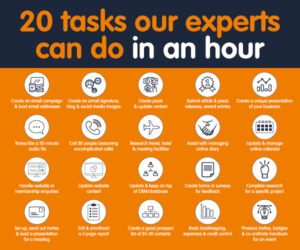Three steps to creating a robust business continuity plan

A valuable lesson we are all learning from the coronavirus pandemic is the importance of business resilience. Get Ahead has helped countless businesses through these unprecedented times, providing outsourced admin and phone answering services, filling in while businesses adjust to the new normal.
What is business continuity planning?
Continuity planning is part of business resilience and includes crisis management. Crises might be anything from a natural disaster, like extreme weather damaging buildings, comms or power supplies, to man-made problems like a devastating computer virus or terror attack. Even if it’s something else entirely, it’s still possible to plan for it. Whether Storm Christoph has flooded your office or coronavirus has claimed key personnel, a robust business continuity plan is essential tool for resilience.
Having a plan in place will save you time and reduce stress should disaster strike. In difficult times, you need to be taking action, not having a meeting. Get your planning done while the going is good so you’ll be ready in an emergency.
Here are three steps to creating a robust business continuity plan to see you through any emergency:
1. Identify what is essential for business continuity.
The first step in business resilience is to look at your current systems and identify the essentials. What do you need to keep your business running? Your business will need a premises to work from, power, internet and communications systems, hardware, software, stock, vehicles and people to deliver the core business.
2. Create Plan B and calculate how long you can survive on it.
Having identified the essentials, you need to work out what you will do if they are not available. As we quickly realised at the start of the pandemic, homeworking is a realistic alternative to coming into the office. Find out if your IT managed service provider can help with disaster recovery and systems backup. These are just examples – go through your list of essentials and create a backup plan for each one.
It is also important to calculate how long you can survive on the backup systems so you can decide what to prioritise. This is called the recovery time objective. For example, if you cannot access internet banking, how long can you last without taking or receiving payments? If you provide a B2B service and you invoice monthly, that might be a few weeks. However, in a retail business, it might be a matter of hours.
3. Decide how this will work in practice.
You’ve contacted your IT provider and found out that they can, say, restore some kind of internet connection within a certain time. But how will that work in practice? Who will have responsibility for ringing them up and asking them to do it? Can that person find the phone number?
Your BCP should include contact details for key personnel in your business, as well as phone numbers for essential services like IT, electricity, telephone banking and emergency services. Remember to ask for consent to include any personal phone numbers so that you stay within GDPR guidelines. The plan should be stored in several places, including hard copy, so it will be available quickly if required.
The last thing to do is to test your plan and see if it works. It is important to keep on testing it – changes of location, personnel and services could each mean a weakness in your plan. Many managed IT service providers offer regular testing of disaster recovery processes and it’s a good idea to harness this expertise.
Virtual assistants support business continuity
There are a number of ways virtual assistants can help you maintain business continuity when disaster strikes. Outsourcing telephone answering, for example, could mean that your customers can still contact your company even if your in-house phones aren’t working. If a member of your team becomes unavailable while there’s still a project to finish, a VA with the right experience can fill the breach. We can also help with press and PR if your story is of public interest. All our VAs are skilled at jumping into new situations quickly, and best of all, you only pay for the hours you need.
If you’re writing or testing your business continuity plan, please consider how a VA could help you provide almost your usual service. We hope you’ll include Get Ahead on your BCP – get in touch today on 01483 332 220 to find out how we could help.








